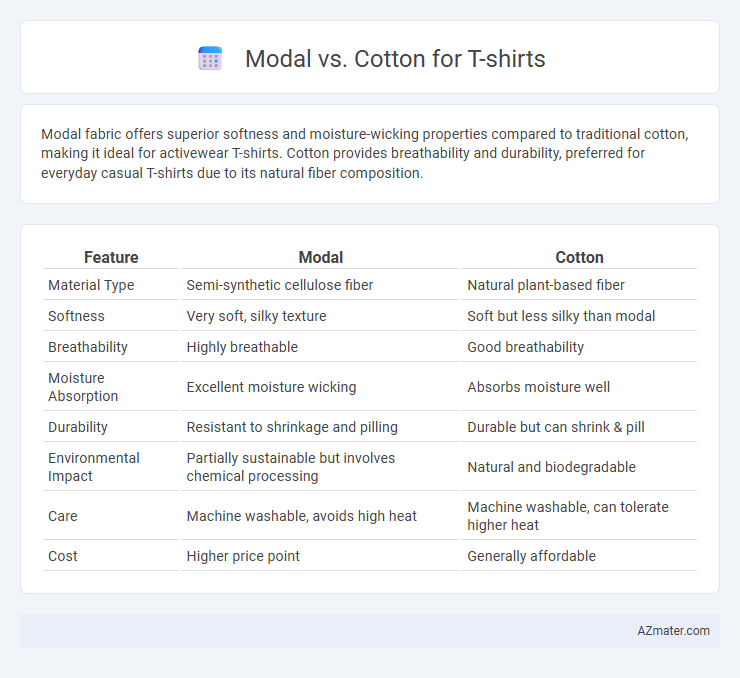Modal fabric offers superior softness and moisture-wicking properties compared to traditional cotton, making it ideal for activewear T-shirts. Cotton provides breathability and durability, preferred for everyday casual T-shirts due to its natural fiber composition.
Table of Comparison
| Feature | Modal | Cotton |
|---|---|---|
| Material Type | Semi-synthetic cellulose fiber | Natural plant-based fiber |
| Softness | Very soft, silky texture | Soft but less silky than modal |
| Breathability | Highly breathable | Good breathability |
| Moisture Absorption | Excellent moisture wicking | Absorbs moisture well |
| Durability | Resistant to shrinkage and pilling | Durable but can shrink & pill |
| Environmental Impact | Partially sustainable but involves chemical processing | Natural and biodegradable |
| Care | Machine washable, avoids high heat | Machine washable, can tolerate higher heat |
| Cost | Higher price point | Generally affordable |
Introduction to Modal and Cotton Fabrics
Modal fabric, derived from beech tree pulp, offers a smooth, breathable, and moisture-wicking texture, making it ideal for soft, comfortable T-shirts. Cotton, a natural fiber harvested from cotton plants, is renowned for its durability, breathability, and hypoallergenic properties, often preferred for everyday wear. Comparing Modal and cotton highlights differences in fabric softness, moisture management, and environmental impact, crucial for selecting the perfect T-shirt material.
Origin and Production Processes
Modal fabric originates from beech tree pulp, undergoing a chemical-intensive, eco-friendly process that transforms cellulose into soft, durable fibers. Cotton is derived from natural cotton plants, harvested and spun into fiber through mechanical and chemical processes that vary by region but often involve water and pesticide use. Modal production typically uses closed-loop systems to recycle chemicals, while cotton cultivation depends on agricultural practices impacting sustainability and fiber quality.
Softness and Comfort Comparison
Modal fabric offers superior softness compared to cotton, providing a smooth, silky feel against the skin that enhances overall comfort. Cotton, while breathable and natural, tends to be slightly rougher and can feel heavier when damp, impacting comfort levels during prolonged wear. Modal's moisture-wicking properties and durability make it a preferred choice for ultra-soft, comfortable T-shirts.
Breathability and Moisture-Wicking Properties
Modal fabric offers superior breathability and moisture-wicking properties compared to cotton, making it ideal for activewear and hot climates. Made from beech tree pulp, modal fibers absorb moisture more efficiently, allowing sweat to evaporate quickly and keeping the skin dry. Cotton, while breathable and soft, tends to retain moisture longer, which can cause discomfort during intense physical activities.
Durability and Longevity
Modal fabric is known for its impressive durability, featuring high tensile strength that resists wear and tear better than traditional cotton. Cotton, while breathable and comfortable, tends to degrade faster with frequent washing, losing shape and softness over time. Modal's resistance to shrinking and pilling contributes to longer-lasting t-shirts that maintain their appearance and feel even after repeated use.
Eco-Friendliness and Sustainability
Modal fabric is derived from beech tree pulp, making it a biodegradable and renewable resource with a lower environmental impact compared to conventional cotton, which often requires significant water, pesticide, and land use. Organic cotton offers a more sustainable alternative to regular cotton by reducing chemical inputs and promoting soil health, but it still demands substantial water consumption. Modal's eco-friendly production involves closed-loop processes that recycle chemicals and minimize waste, positioning it as a sustainable option for T-shirts alongside responsibly sourced cotton varieties.
Cost and Affordability
Modal fabric typically costs more than cotton due to its semi-synthetic production process and luxurious feel, making it a pricier option for T-shirts. Cotton is widely available and produced in large quantities, resulting in lower prices and greater affordability for everyday wear. Budget-conscious consumers often prefer cotton T-shirts for their cost-effectiveness without sacrificing comfort.
Care and Maintenance Requirements
Modal fabric requires gentle washing in cold water and air drying to maintain its softness and prevent shrinking, while cotton is more durable and can withstand regular machine washing and higher temperatures. Modal shirts benefit from avoiding bleach and tumble drying to preserve fiber integrity, whereas cotton can handle more rigorous care but may fade or shrink over time. Proper care extends the lifespan of both materials, with modal needing more delicate handling and cotton offering easier maintenance for everyday wear.
Suitable Uses for T-Shirts
Modal fabric offers exceptional softness, moisture-wicking properties, and breathability, making it ideal for activewear and casual T-shirts worn during warm weather or physical activities. Cotton is highly durable, hypoallergenic, and breathable, suited for everyday wear, casual outings, and sensitive skin needs. For T-shirts requiring softness with a lightweight feel and moisture management, Modal is optimal; for durability and natural fiber preference, cotton remains the top choice.
Which is Better: Modal or Cotton for T-Shirts?
Modal fabric offers superior softness, durability, and moisture-wicking properties compared to traditional cotton, making it ideal for active wear and comfort-focused T-shirts. Cotton, however, excels in breathability and natural fiber content, providing excellent comfort for everyday casual use and sensitive skin. Choosing between modal and cotton depends on prioritizing enhanced softness and moisture management or natural fiber benefits and breathability in T-shirt performance.

Infographic: Modal vs Cotton for T-shirt
 azmater.com
azmater.com